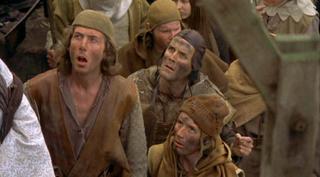
I appreciate many of the criticisms leveled against the intelligent design (ID) movement, and I understand the concerns voiced by many scientists about bringing ID into the public classroom. What I simply can't stand is the complete failure on the part of said critics to understand the ID movement.
Proponents on both sides act as if they have their hands over their ears, yelling, "La, la, la, la! I'm not listening!" But today, I'd like to forgo my mantle of peace-maker and take the anti-IDers out to the woodshed.
If ID is bad science, let's have a detailed, scientific critique that specifically identifies the problems. But rhetoric is all we get. Moreover, the rhetoric is alarmingly ignorant. Most of the opponents of intelligent design are coming across as knee-jerk reactionaries. They automatically equate ID with "Creationism" and the lot. Trust me, as someone who's read their stuff, ID is a whole new ball game. It is not simply the same monkey in a new suit. It's a new monkey, and the monkey went and got himself a PhD.
Here's what set me off -- an
official document from the National Center for Science Education. This article is misleading and gives a very unscientifically biased assay of the situation. The intelligent design movement is charicatured, and the authors clearly use a "guilt by association" tactic to make ID look bad. ID is not even in the same species as creation science. For instance, the ID movement explicitly includes under its umbrella the idea of "theistic evolution" (although many theistic evolutionists would rather stand out in the rain). ID is also labeled as "unscientific" or "not science." To say that Behe's and Dembski's arguments aren't scientific because the scientific community hasn't embraced them is circular reasoning.
"What is scientific?"
"
Something embraced by the scientific community.""How do you acheive this embrace?"
"
By being scientific."Joseph Heller would be proud.
I guess the shoe is now squarely on the other foot. In the Scopes trial, the roles were reversed, and it was the Christians who acted like the proverbial subterranean-headed ostrich. Now who has their panties in a wad? Who won't even give a hearing to their opponents? Who is the witch, and who is the mob? ("How do you know she is a witch?" "She looks like one!")





